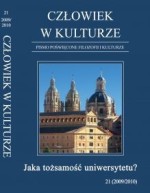Uczony – suweren czy funkcjonariusz?
The scholar – sovereign or functionary
Author(s): Henryk KiereśSubject(s): Philosophy
Published by: Fundacja »Lubelska Szkoła Filozofii Chrześcijańskiej«
Keywords: university; scholar; sovereignty; Western civilization
Summary/Abstract: In this paper the Author discusses three issues. First, he takes the problem of science in contemporary culture. He notices that the quality of civilization award shows and organizes various cultural fields - science, morality, art and religion - and political (prudent) security of their existence. Therefore he draws attention to the so-called “systemic transformation” which is now widespread, and which legitimizes the intervention of state institutions in science. The source for this approach is the conviction of the deficiency of the previous system, and perceptions about the need to transform education. Unfortunately, as a result of these reforms only the form of propaganda is changed and science is separated from the tradition. The second problem, which the author undertakes is a dispute over human. It shows that there are two opposite concepts of society: the collective and personalistic. The first - based on socialism – depreciates the role of the individual, uses terror, appropriates education and puts ideology over reality. The second one treats each human as a person who transcends the world of nature, and creates the culture. The key thesis of personalism is that man is the unity of the living conditions of a rational nature (individua substantia rationalis naturae). Man is, therefore, sovereign and free. Society is a relational being which comes from the man, and being weaker than him plays fully subservient role to him. The third problem, which the author considers, is a place of the university in culture. The main argument here is that the university is “the instance of Truth” and the universal (over territorial) organization.
Journal: Człowiek w Kulturze
- Issue Year: 2009
- Issue No: 21
- Page Range: 85-98
- Page Count: 14
- Language: Polish

